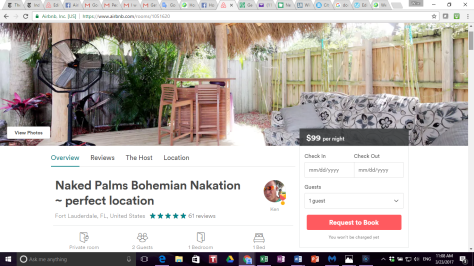What makes for a good Airbnb guest?
There are some things that are more obvious about what makes a good guest: someone who is respectful, who communicates well, who cleans up after themselves. But there are other aspects of what makes for a good Airbnb guest, which may be less obvious to those who haven’t been hosts, or who haven’t participated in conversations about guests in the community of hosts. One of the most frequent complaints from hosts about guests, is that the guest is wanting something that the host isn’t offering – or not only wanting it, but expecting or demanding it. So in essence there is a mismatch between what the host is offering and what the guest is seeking, and this mismatch too often is lost on the guest.

Let’s take a concrete example so it may be clearer. Say you are going on vacation and want to rent a car. You look at the offerings of the local car rental company and decide to rent a compact car, say a Ford Fiesta or Toyota Corolla, because the price fits your budget. Then on the day you go to pick up the car and start your trip, you go to the car rental agency and express surprise that the Toyota Corolla isn’t larger, saying that you have 6 people in your party and you need more space. You demand an upgrade to a Dodge Minivan, but insist that you won’t pay more than for the Compact Car rental, arguing that any decent car rental should be one that can fit 6 people. Now the car rental company will most certainly refuse to give you a Dodge Minivan for the price of a Toyota Corolla. Why do guests expect Airbnb hosts to do any different?
Perhaps the greatest value of the many places to stay on Airbnb (literally millions now!) is the diversity of places to stay. There is something for everyone on Airbnb. Hence, it is really possible for guests to find exactly the type of space that suits them, particularly if they are looking sufficiently far in advance of their trip. There are small quiet spaces for one person, there are large homes for large groups. There are listings where no fragrances or smoking is permitted, and others which encourage guests who partake of Cannabis (see www.budandbreakfast.com). There are places featuring swimming pools, and encouraging families, encouraging recreating at the listing, and there are minimalist listings for busy adults, oriented to those who are going to be out a lot. There are listings specifically for certain interest groups, such as nudists on “nakations” .  There are listings in treehouses, requiring climbing up a ladder to access, and listings on flat ground, suitable for those in wheelchairs. There are those featuring pet dogs or llamas and welcoming pets, and listings with hosts (or aimed at guests) who are allergic to dogs or cats and can’t accommodate them. There are listings in RV’s, tents, yurts, cabins, and yachts.
There are listings in treehouses, requiring climbing up a ladder to access, and listings on flat ground, suitable for those in wheelchairs. There are those featuring pet dogs or llamas and welcoming pets, and listings with hosts (or aimed at guests) who are allergic to dogs or cats and can’t accommodate them. There are listings in RV’s, tents, yurts, cabins, and yachts.
Precisely because there is such a robust abundance of types of listings and immense variety in places to stay, it always strikes me as odd, and not infrequently rude, when guests ask to stay at listings that clearly do not suit their needs or their expectations. Hosts who don’t’ allow smoking on the premises, too often report finding cigarette butts and ashes inside the property after the guest departed. Hosts who have a maximum of say 4 guests, often come to the host community to vent about how they saw 6 or 8 guests with luggage in tow departing the listing on check out day. Hosts who don’t’ allow pets report getting inquiries and reservation requests from guests with dogs or “emotional support service animals” asking to stay at their home. Hosts with a clearly stated price, get inquiries from guests who are asking for a 40-50% discount from that stated price. Hosts whose maximum stay is 7 days get guests inquiring asking to stay 3 weeks. Hosts who have strict cancellation policy, get guests who cancel and expect a refund which is not in keeping with the strict cancellation policy. Hosts who ask guests to read the house rules before booking, get guests booking and violating the house rules, later saying “I didn’t know about that rule: you should have told me about it in advance.” A host who specifies that their listing has a maximum occupancy of two, and may not be suitable for small children, reports getting a reservation request from an adult couple, who they accept, only to hear later from the couple that the couple plans to bring their two small children along.

One could view all these cases, as an attempt by the guest to force the provider to swap out a Toyota Corolla for a Dodge Minivan at the price of the Compact Car. Particularly in the case where the guests are bringing more people (sometimes many more!) than they stated at the time of the booking, they really are dishonestly seeking to get more for less. But given the huge number of such situations, as reported by hosts, as well as the fact that a person renting a car would have no luck in getting a Minivan for the price of a Compact just by claiming “I didn’t know” when they were booking it, we have to ask what is going on. Why are so many guests expecting something at the listing that not only they haven’t paid for, but in many cases is expressly prohibited by the host? Why are there so many mismatches?
I see three possible explanations for this problem, which are interrelated. One has to do with a common complaint of hosts “the guest didn’t read the description of my place!/didn’t read my house rules!” If a guest books without knowing what they are actually booking, there are bound to be problems. Sometimes, in order to try to avoid this type of problem, hosts will trim down their listing description or list of house rules, theorizing that there’s a better chance of the guest reading everything, if the amount they have to read is less. Unfortunately the problem with this approach is that something that was quite important to know, has been chopped out. As I like to tell hosts, when they ask, “What is the most important house rule?” – it’s the house rule that you left out of your house rules. It’s Murphy’s Law as applied to Airbnb hosting. You can be sure that the issue that will become significant during a guests’ stay, has to do with the house rule you decided to remove from your house rules, because you were worried that your house rules were becoming too much “like the yellow pages.” Eg…very long.
On that note – I have heard a good number of people say that they will not book a place that “has a long list of house rules”. I find this odd, because house rules very rarely anything more than a sincere attempt by a host to prevent potential problems and ill fitting expectations, by communicating clearly about what they are offering. House rules are also very often a result of experience – they reflect the fact that the host has learned from experience (eg learned that a short list of house rules is inadequate) and now is communicating in a more complete way. So for a prospective guest to say, “I don’t want to book there – they have too many house rules” is sort of like saying, “That host communicates too clearly – I would rather they communicated poorly – and they are too thoughtful—I would prefer they didn’t have the experience and wisdom that they have. Also the host does too much to protect their own property – I’d rather that they were less able to protect their property and themselves from liability.” That is what guests may be saying when they argue against hosts communicating what needs to be said.
As well, to refuse to book a place with “lots of house rules” is often presumptuous — presuming that the intent of the rules is punitive. But hosts don’t make rules like “Don’t have fun here! Snap to it, sit in the chair in a corner with a dunce cap on!”

Have you ever seen that? No, rather the rules tend to be little more than common sense, such as “don’t’ put on hair dye and then lie down on my expensive linens.” Hosts ourselves really don’t’ like it that we have to write a dozen or two dozen statements which are little more than common sense, but intelligent guests will take this more as a comment about other people’s lack of common sense, than the hosts’ punitive personality.
When guests refuse to book at a listing that has “a lot of house rules” what they are often doing, without realizing it, is devaluing an experienced host, and showing preference for someone less experienced & perhaps more naïve – who may in fact not be able to adequately ensure/protect the guests’ own quality of experience. If a guest books a place that has no set quiet hours, perhaps they will begin to realize the wisdom of having more house rules when another guest at the same house makes too much noise after midnight, and the host finds it difficult to do anything about this, saying “this is a chill house, I didn’t want to write too many rules.”
But for those who really are allergic to “long lists of rules” — there is a simple solution. Don’t book at a place with such rule lists! Like any decent match, this should be easy enough to do, and yet it surprisingly frequent that hosts report guests booking and then not following the rules. In fact, I even saw one blog by what looked like a well-experienced Airbnb guest, which actually encouraged people to violate host’s house rules if there were too many of them. This goes way beyond an accidental mismatch or one resulting from laziness or inattention, and becomes an intentional act of disrespect and rudeness, even bullying of a host. Instead of “book a place because it’s a good match”, we are seeing some guests booking or trying to book, precisely because they dont’ match the host or the listing. As I’ve written elsewhere, I think this exceptionally rude approach can be linked to our contemporary entitlement culture, which focuses heavily on people’s “rights” and minimizes the duties that come with respecting one another.
The second potential explanation for this difficulty in mismatches, which I think is related to the first, is that too many guests don’t view an Airbnb host or their listing in the same professional way, as a solid business, as they would view a car rental agency. I contend that many guests come with an expectation that Airbnb hosts aren’t actually businesspeople doing business, but are “just plain folks” who can potentially be manipulated/unseated by a pushy or aggressive approach, or who are likely to wobble if shoved.  And unfortunately guests may be right in this assessment of hosts, as we can see in all the situations where hosts, perhaps desperate to get a booking, tell the guest that “I don’t’ ordinarily allow children/pets/emotional support llamas/smoking/guests with 17 suitcases/4 month long bookings, but I will permit it in this case…” And then the wobbling begins. I urge hosts to think of themselves as a business, act as a business, develop policies and rules, and stick to those. You may think you are doing guests (and/or yourself) a favor when you make exceptions, but when you do that, you are also teaching guests that hosts’ may not always mean what they say, that they can be manipulated, their rules overcome with enough prodding.
And unfortunately guests may be right in this assessment of hosts, as we can see in all the situations where hosts, perhaps desperate to get a booking, tell the guest that “I don’t’ ordinarily allow children/pets/emotional support llamas/smoking/guests with 17 suitcases/4 month long bookings, but I will permit it in this case…” And then the wobbling begins. I urge hosts to think of themselves as a business, act as a business, develop policies and rules, and stick to those. You may think you are doing guests (and/or yourself) a favor when you make exceptions, but when you do that, you are also teaching guests that hosts’ may not always mean what they say, that they can be manipulated, their rules overcome with enough prodding.
The third explanation for this type of problem with guest mismatches, is that the system itself (Airbnb’s policies and booking system) doesn’t sufficiently penalize those who knowingly book a space that doesn’t match their needs or expectations, and hence, guests who book a Toyota Corolla and then become abusive with contempt that they didn’t get a Dodge Minivan, may find that far from themselves being penalized for their failure to book an appropriate listing, the system actually allows them to penalize the host for not delivering up a Minivan. They can complain to the host while at the premises, and threaten to contact and complain to Airbnb, which may side with them, particularly if they have not heard the hosts’ side of the story. They can write a “revenge review” after the stay, marking the host down from 5 stars to 1 or 2 stars, for not providing a Minivan for the price of a Compact Car. Airbnb at this time unfortunately doesn’t have a policy of removing reviews which are factually, materially false, because it has no method to ascertain what is true or false.
What is a good Airbnb guest? A good guest is not only someone who is respectful, clean, and communicative but also is someone who is careful to make sure that the listing where they are booking, is actually a good match for their own needs and expectations, and those of the party they are traveling with.


In order to support more real matches, and less frequent problems with guests in essence paying for a Motel 6 and expecting the Ritz Carleton, guests must put in more effort to read the entire listing description and amenities offered, as well as the house rules. To encourage this, hosts should ask guests to read all of this before they allow someone to book (Instant Book by its nature does not allow this step in the process, and hence I discourage anyone from using it) As well, Airbnb would do better to support hosts when guests book at a place that their needs/expectations do not fit, such as by allowing the host to cancel such a guests’ reservation without penalty, and/or by being able to remove reviews which are clearly “revenge reviews” whereby resentful and irresponsible guests seek to punish hosts for not provide or permit what they never claimed they would provide, and what the guest was wrong to presume would be permitted.



What a great statement! There is so much good advice in here, thank you.
LikeLike
I’ve just discovered your blog through an Airbnb Facebook group and have now read several of your posts – they are terrific!
I have had very few problems of any note with guests over four years of hosting first two, then three, seasonal places in Maine, where most of the visits take place in the summer. I don’t think it’s because I’m a better host than others. I can really only attribute it to one thing: I charge more than almost anyone else around. I occasionally have Airbnb send out a special discount offer, and lower the prices a little in the off-season. But I never agree to anyone who writes and asks for a discount.
Given your background as a psychotherapist and your master’s in psychology, I’d be very interested in your take on what I see as a paradoxical phenomenon that appears to be “the more people pay, the less they complain.” I believe they do get very good value and that I’m not overcharging. What are your thoughts?
LikeLike
Hi Ann, I’m delighted that you found this blog site and that you like these articles. I believe that what I have to offer here in my writing, is less profit-centered and more thoughtful (as well as, sometimes, more creative) than what is generally written about hosting.
On your question, about the apparent paradox of the more people pay, the less they complain — I think what you’re seeing there relates to the fact that many of the most entrenched complainers are entitled people who, among other things, believe they are entitled to discounts and to paying less. The basic problem with their perspective, is that they are over-valuing their own needs and under-valuing the needs of the host. So it’s a kind of selfishness that is involved. In its more extreme forms, this could issue out of the profound self-centeredness that is related to Narcissistic Personality Disorder. Or it could just correlate to the narcissism of a highly egotistical person, or a person with inadequate feeling development or ability to put themselves in anyone else’s shoes.
If people are wiling to pay a higher than average price to stay at an Airbnb, this in itself indicates that they understand they are willing to pay to get good value. It shows that they have an understanding of the host’s need to be compensated for all the things they are providing. Now at really high luxury levels of offerings, you might get some “princesses” who are willing to pay high prices but want to be waited on hand and foot in exchange for that. But I think overall, the worst complainers are likely to be people who dont’ think they should have to pay to get value — so they will be seeking discounts and less expensive stays.
This may not be a problem for those like yourself able to command higher prices because of what you can offer, but isn’t an option for everyone. Essentially, to use the metaphor used in this article, you are offering a Dodge Caravan rental, so when you charge prices commensurate with a Dodge Caravan, you’ve escaped the problem of the situation of the host offering the Toyota Corolla to someone who wants to pay for the Corolla but actually get a Dodge Caravan rental.
For hosts who really do have only modest budget accomodations to offer, eg the Toyota Corolla, regardless of how clear they attempt to be about the limitations of their listing, they are likely to end up stuck with some whiny guests who will ceaselessly seek to get more for less in life.
LikeLike
You’ve nailed it! I never thought of it in those terms. I think you’ve mentioned the entitlement that seems rampant in society today once or twice, and I agree – but I can’t make sense of it. I would hate to feel victimized by overly demanding, unappreciative guests – that would ruin the experience of hosting for me.
I do encourage people to experiment with raising their prices. During my first season, my prices were relatively modest. I wanted to get enough bookings and reviews to establish a good base. The next year, I raised my prices quite a bit. I got more bookings than the previous year and of course more income. Even though we live in a Walmart world, I think there are still people out there who believe that paying a little more guarantees more value.
I also think your advice to be firm with people is essential. If you politely resist the initial demand, you might find that the demands stop. If you give in, they will almost certainly continue.
Thank you so much for responding – your answer was really enlightening. I’ll keep reading your posts!
Best,
Ann
LikeLike